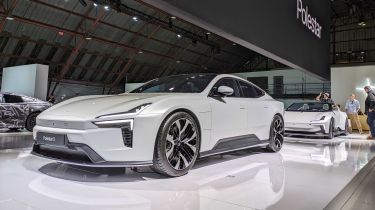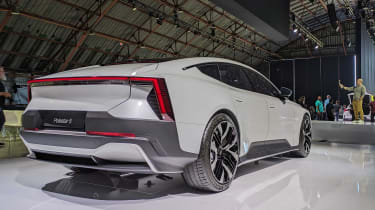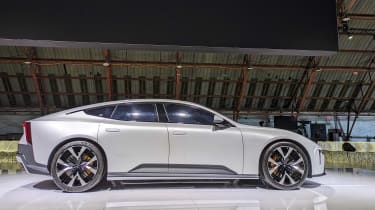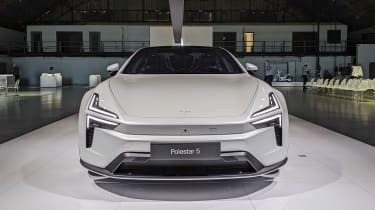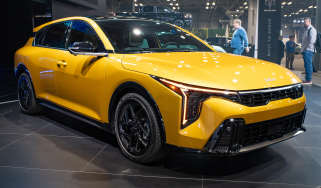New Polestar 5: specs and full details on the Porsche Taycan rival
Polestar’s UK-developed 5 is going to take the fight to the big players at the top of the premium performance EV class. Here’s what we know now…
The numerical naming strategy of Polestar has seen the 3 and 4 arrive in 2024, and soon we’ll be getting the Polestar 5 in 2025. We already know plenty about the Swedish executive EV thanks to seeing it blast up the hill at the 2023 Goodwood Festival of Speed, a full exterior design unveiling and even a revealing ride in an early prototype version of the car.
The Polestar 5 will arrive as the flagship model in the brand’s line up, a luxury four-door coupé to rival the likes of the Porsche Taycan, Tesla Model S and Lotus Emeya. It will sit above the Polestar SUV range that’s set to comprise the 2, 3 and 4 models and it will eventually be joined by the Polestar 6, a two-door roadster or coupé based on the same bespoke aluminium chassis.
While we saw the Polestar 5 in its full production bodywork over a year ago, fresh spy shots suggest that it is undergoing its last stages of development in northern Sweden – no doubt focusing on towing capacity (a tow bar is visible to the rear) and cold-weather efficiency.
What does the Polestar 5 look like?
We saw the Polestar 5 in its production form in Los Angeles towards the end of 2023. While it was originally destined to launch in 2024, this has since been pushed back to 2025. The production car will look identical to the model shown off in LA, with a sleek four-door grand touring body helping it visually stand out from a growing range of all-electric premium saloon cars.
At the front, the ‘Thor’s hammer’ headlight design that Polestar inherited and evolved from its one-time parent company Volvo has been split into two elements. In the nose, is Polestar’s ‘SmartZone’ a body-coloured panel hiding the sensors for the car’s driver assist systems. It’s an innovation that former design boss Maximilian Missoni is particularly proud of: “It took so much effort to integrate these systems under a body colour panel,” he said. So much so that it actually has a small ‘SmartZone’ label – something already seen on the Polestar 3 and 4.
The front wheelarches flare outwards and the front air intake gets a dark surround that flows right around the entire perimeter of the car at the lower edge. This dark plastic border steps up to create a scalloped effect along the door sills at the sides and the glasshouse remains slim for sporty effect. A thin styling element sticking out beyond the glass area at the rear visually elongates the roofline and adds to the sleek look. The low, long look of the 5 has been achieved despite the need to fit a chunky battery pack under the floor.
Unsurprisingly, the ‘suicide’ rear doors from the Precept Concept car that laid the groundwork for the Polestar 5 back in 2020 don’t make it to production, although the expansive glass roof that’s becoming a Polestar trademark and distinctive tail-light bar do.
Indeed, it’s at the rear of the Polestar 5 that the designers have let their hair down. That light bar runs the width of the tailgate, protruding out from the bodywork and jutting downwards at either end to connect with the darker bumper area.
The Polestar 5 also takes a lead from the Polestar 4 coupé-SUV in not having a rear window. Drivers will need to utilise a combination of side mirrors and the rear facing camera that displays a video feed on a screen in the rear view mirror.
This feature was adopted in the Polestar 4 as a means of achieving a long-flowing roofline without impinging on rear passenger headroom. Axing the rear window allows the structural crossmember in the car’s roof to be shifted further back, so the roofline can begin to drop away behind the heads of back-seat occupants.
What is the Polestar 5 like inside?
The car displayed to reveal the Polestar 5’s production bodywork had its entire interior hidden from view, but we have sat inside the interior of prototype cars. Just like the exterior, the cabin looks similar to that of the Precept concept car. While it was clearly not finished in the versions we have seen so far, with a kill switch on the centre console and exposed vents, the overall layout is similar to the Polestar 2’s with a large central touchscreen. The steering wheel looks more like that of the Precept than the Polestar 2, with a different centre and a flat-bottomed design.
The Polestar 5 is a large car of around 4.7 metres long with a 3.1-metre wheelbase, which means it’s close to matching a Mercedes S-Class limousine for scale. Our ride in the Polestar 5 revealed very good levels of space for rear seat occupants facilitated by the windowless arrangement at the rear and an airy feel courtesy of the full length glass roof.
Expect extensive use of recycled and plant-sourced materials inside, as Polestar tries to avoid the use of ‘virgin plastics’. The company has already confirmed that it is working with external partner Bcomp on a flax-based composite that could be used for exterior parts as well as in the cabin and there are many other initiatives under way as part of the brand’s Polestar 0 project to create a carbon neutral car by 2030.
The Precept concept car debuted innovative ambient lighting that shines through trim materials to create ‘organic’ lighting effects. This technique appears in the Polestar 4 and we expect to see it in the Polestar 5 as well, along with the latest version of Polestar’s impressive Google-based infotainment system.
What powertrain and performance can we expect in the Polestar 5?
The Polestar 5 is set to get a dual-motor electric powertrain with 874bhp and 900Nm of torque. With one motor on each axle for four-wheel drive, it has the specs to match the top models at the top of the large, luxury EV segment.
The car should deliver engaging driving dynamics to accompany the immense power from its electric motors. Pete Allen, Head of Polestar UK R&D, said: “The platform combines low-volume performance car attributes with modern technological advances to bring light-weight, high-rigidity sports car chassis technology into mass production.”
Just like the Polestar 3, we can expect a single-motor variant to be offered with the Polestar 5 as well. While this should naturally increase range (if it gets the same size battery capacity as the dual-motor), power will obviously decrease from the all-wheel-drive’s 874bhp. Our ride review of the Poelstar 5 single-motor form indicated that it would still provide plenty of punch.
That platform is a bespoke bonded aluminium creation engineered for the Polestar 5 in the UK at the brand’s development facility at the Horiba MIRA site near Nuneaton, overseen by more than 400 Polestar engineers. It will also form the basis for the Polestar 6 sports car.
What do we know about the Polestar 5’s range and charging?
Former Polestar CEO Thomas Ingenlath previously suggested that the Polestar 5 is likely to have no more than 500km (310 miles) of range as Polestar focuses on fast recharging rather than headline grabbing range figures. “A premium sports car like this has to have a range that’s competitive,” he said. “But we cannot allow ourselves to drift away into that race for range. If you’re talking about making a car more efficient, that’s great. If you’re talking about packing more and more kWh into the car to make the best range figure, it’s crazy because that doesn’t help us get closer to making a sustainable car.”
He added: “Once a car is anywhere between 450-550km of range, why would you go for more? I can’t drive that much longer and my kids want to stop by then. You have to have a decent range, but it’s also defined by how long you can sit in the car and travel without needing the bathroom, for example. And at that point, where you stop. Much more importantly, there should be fast charging.”
To this end, Polestar is working with StoreDot on its ‘extreme fast charging’ battery technology (XFC). The system is claimed to be able to add 100 miles of range to an electric car in five minutes of charging at a 350kW charger. With no additional heat build-up or battery degradation, it’s an exciting development and Polestar plans to fit it to a working Polestar 5 prototype in 2024. It’s unlikely to be ready for the expected launch of the Polestar 5 in 2025 but may come soon after as an additional battery option to the standard 110kWh unit that is expected to be offered from launch.
Where will the Polestar 5 be built?
The Polestar 5 will be built at an as-yet-undisclosed location in China with the Polestar 6 that uses the same platform eventually joining it at the same facility. The batteries will be supplied by South Korea’s SK On.
Now check out the latest Polestar news and reviews...
Find a car with the experts
